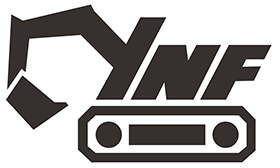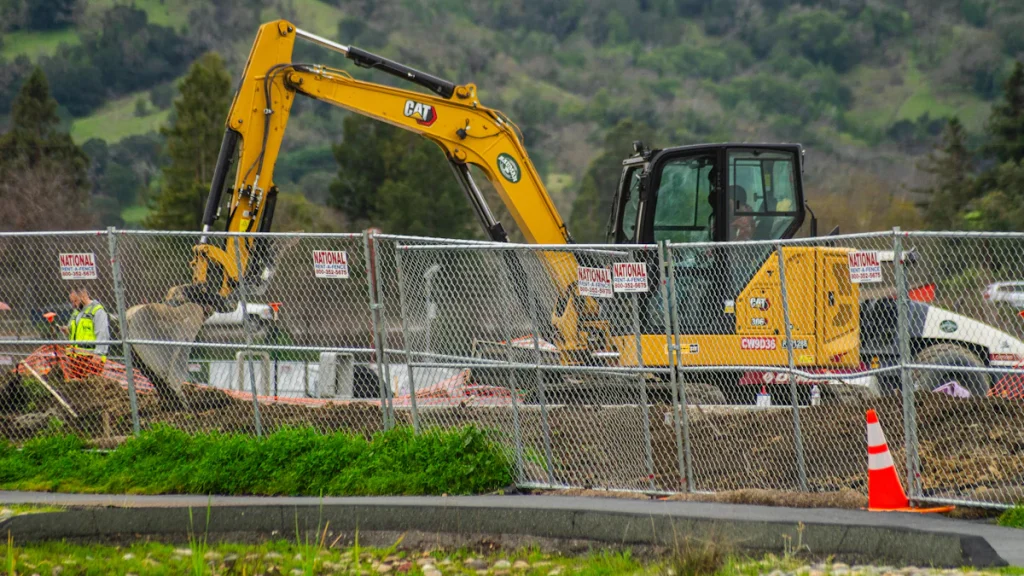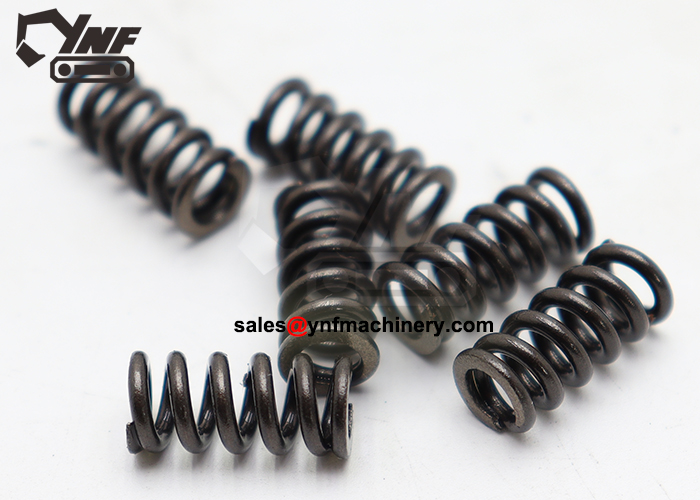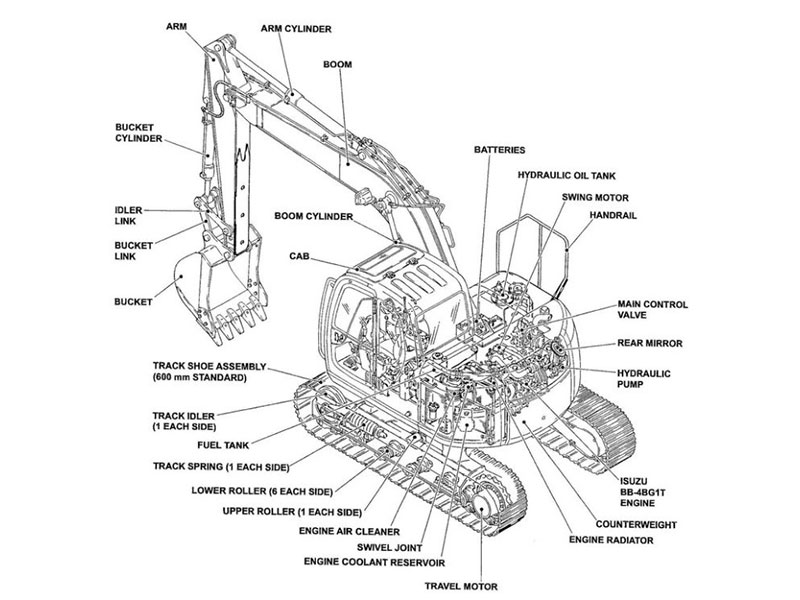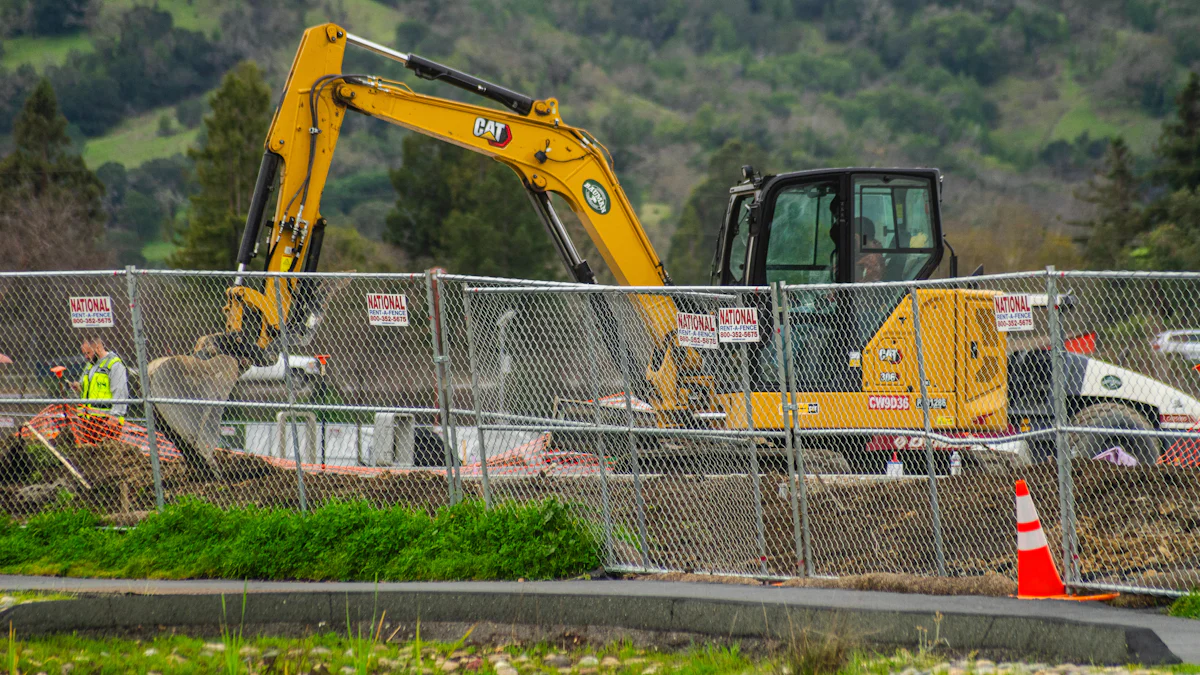
Choosing the right excavator bucket teeth plays a vital role in improving your machine’s performance and efficiency. Each type of tooth is designed to handle specific tasks, ensuring better results and reduced wear on your equipment. For instance, sharp teeth provide excellent penetration into tough materials, while durable designs extend the lifespan of your bucket. By selecting the appropriate teeth, you can enhance digging precision, boost productivity, and save on maintenance costs. This decision not only impacts the efficiency of your work but also ensures the longevity of your excavator.
Key Takeaways
Choosing the right excavator bucket teeth enhances machine performance and efficiency, leading to better results and reduced maintenance costs.
General-purpose teeth are versatile and suitable for various tasks, making them ideal for operators who frequently switch between projects.
Rock bucket teeth are essential for tough terrains, providing exceptional durability and penetration power for demanding applications like mining and demolition.
Heavy-duty teeth are designed for maximum strength and longevity, making them perfect for earthmoving and infrastructure projects that require reliable tools.
Tiger bucket teeth excel in precision digging and trenching, offering superior penetration for hard materials but may require more frequent replacements.
Flared bucket teeth are best for moving large volumes of loose materials quickly, enhancing efficiency in landscaping and agricultural tasks.
Understanding the specific applications and limitations of each type of bucket tooth allows operators to make informed decisions that maximize productivity and extend equipment lifespan.
General-Purpose Excavator Bucket Teeth
Description and Features
General-purpose excavator bucket teeth are designed to handle a wide range of tasks, making them highly versatile. These teeth strike a balance between strength and durability, allowing them to penetrate various materials effectively. Their moderate weight ensures ease of use without compromising performance. Additionally, they can withstand abrasive conditions, which makes them suitable for environments where digging conditions frequently change. If you often switch between different types of projects, these teeth provide a reliable solution.
Manufacturers often equip general-purpose teeth with a standard profile that ensures compatibility with most excavators. This design simplifies installation and replacement, reducing downtime. Many operators prefer these teeth because they offer a practical combination of performance and adaptability.
Applications
You can use general-purpose excavator bucket teeth in numerous applications, thanks to their versatility. They perform well in:
General excavation: Ideal for digging soil, clay, and other moderately compact materials.
Landscaping projects: Useful for tasks like grading, trenching, and clearing debris.
Construction sites: Suitable for handling mixed materials, including gravel and sand.
Utility work: Effective for digging trenches for pipelines or cables.
These teeth adapt to changing conditions, making them a dependable choice for projects requiring flexibility.
Advantages and Limitations
Advantages:
Versatility: These teeth work well across various tasks and materials, reducing the need for frequent replacements.
Durability: Their ability to tolerate abrasive conditions minimizes wear and tear, extending their lifespan.
Ease of use: The standard design ensures compatibility with most excavators, simplifying installation and maintenance.
Cost-effectiveness: Their adaptability reduces the need for specialized teeth, saving you money on equipment.
Limitations:
Performance in extreme conditions: While versatile, these teeth may not excel in highly specialized tasks, such as breaking through hard rock or compacted ground.
Wear rate: In static or highly abrasive environments, specialized teeth may last longer than general-purpose ones.
“If your digging conditions are changing often, this is the best tooth for you. However, if your digging conditions will remain static, a more specialized bucket tooth profile will be a better option.”
When choosing general-purpose excavator bucket teeth, consider the nature of your projects and the materials you’ll encounter. These teeth offer a balanced solution for operators seeking flexibility and reliability.
Rock Excavator Bucket Teeth

Description and Features
Rock excavator bucket teeth are specifically engineered to handle the most challenging terrains. These teeth excel in rocky environments and hard soil conditions, where standard teeth might fail. Manufacturers craft them using specialized alloys, which provide exceptional durability and strength. This robust construction ensures they can withstand high-impact forces and abrasive materials without breaking or wearing down quickly.
The design of rock bucket teeth often includes reinforced tips and a sharper profile. These features enhance their ability to penetrate dense, compacted ground and break through tough materials like stone and gravel. Heat-treated alloy steel is commonly used in their production, offering superior wear resistance. This material choice not only extends the lifespan of the teeth but also reduces the frequency of replacements, saving you time and money.
Applications
Rock excavator bucket teeth are indispensable for projects involving hard and abrasive materials. Their specialized design makes them ideal for:
Quarrying and mining: Perfect for breaking through rock formations and extracting minerals.
Road construction: Effective for cutting through compacted ground and rocky surfaces during excavation.
Demolition work: Useful for handling debris and breaking apart concrete or asphalt.
Heavy-duty excavation: Suitable for digging in areas with dense, rocky soil or mixed materials.
These teeth are a reliable choice when your work involves tough conditions that demand strength and precision.
Advantages and Limitations
Advantages:
Exceptional durability: The use of heat-treated alloy steel ensures these teeth last longer, even in abrasive environments.
High penetration power: Their sharp profile and reinforced tips allow them to cut through hard materials with ease.
Cost efficiency: Despite their higher initial cost, their extended lifespan and reduced replacement frequency make them a cost-effective option.
Versatility in tough conditions: They perform well in demanding applications, such as mining and demolition.
Limitations:
Limited adaptability: These teeth are less effective in softer soils or general-purpose tasks, where their sharpness and strength are unnecessary.
Higher upfront cost: Their specialized design and materials make them more expensive than standard bucket teeth.
“Rock bucket teeth are your go-to solution for tough terrains. Their durability and strength ensure optimal performance in the harshest conditions.”
When selecting rock excavator bucket teeth, consider the nature of your project and the materials you’ll encounter. These teeth are an investment in efficiency and reliability for demanding tasks.
Heavy-Duty Excavator Bucket Teeth
Description and Features
Heavy-duty excavator bucket teeth are built to endure the most demanding digging conditions. These teeth feature thicker edges and reinforced structures, ensuring they can handle intense workloads without compromising performance. Manufacturers often use heat-treated alloy steel to craft these teeth, which enhances their wear resistance and durability. This robust construction minimizes the risk of breakage, even when working in abrasive environments.
The design of heavy-duty teeth focuses on strength and longevity. They are ideal for operators who need reliable tools for challenging tasks. Products like Forged Bucket Teeth stand out due to their exceptional toughness and ability to withstand high-impact forces. Additionally, these teeth reduce the frequency of replacements, saving you time and maintenance costs. Their superior build quality ensures consistent performance, even under extreme pressure.
Applications
Heavy-duty excavator bucket teeth excel in projects that require maximum strength and durability. You can rely on them for:
Earthmoving and excavation: Perfect for digging through compacted soil, clay, and other tough materials.
Mining operations: Effective for handling abrasive rocks and extracting minerals in harsh conditions.
Demolition tasks: Suitable for breaking apart concrete, asphalt, and other dense materials.
Infrastructure projects: Ideal for large-scale construction work, such as road building and foundation digging.
These teeth are a dependable choice for tasks that demand resilience and precision.
Advantages and Limitations
Advantages:
Enhanced durability: The heat-treated alloy steel construction ensures these teeth last longer, even in abrasive conditions.
High strength: Their reinforced design allows them to handle heavy loads and high-impact tasks with ease.
Cost efficiency: Reduced maintenance and replacement needs make them a smart investment for long-term use.
Versatility in tough environments: They perform exceptionally well in demanding applications, such as mining and demolition.
Limitations:
Limited use in light tasks: These teeth may not be necessary for softer soils or less demanding projects.
Higher initial cost: Their advanced design and materials result in a higher upfront expense compared to standard teeth.
“Heavy-duty bucket teeth are your best option for challenging projects. Their strength and durability ensure consistent performance in the toughest conditions.”
When choosing heavy-duty excavator bucket teeth, consider the nature of your work and the materials you’ll encounter. These teeth provide a reliable solution for operators who need tools that can withstand rigorous demands.
Tiger Excavator Bucket Teeth
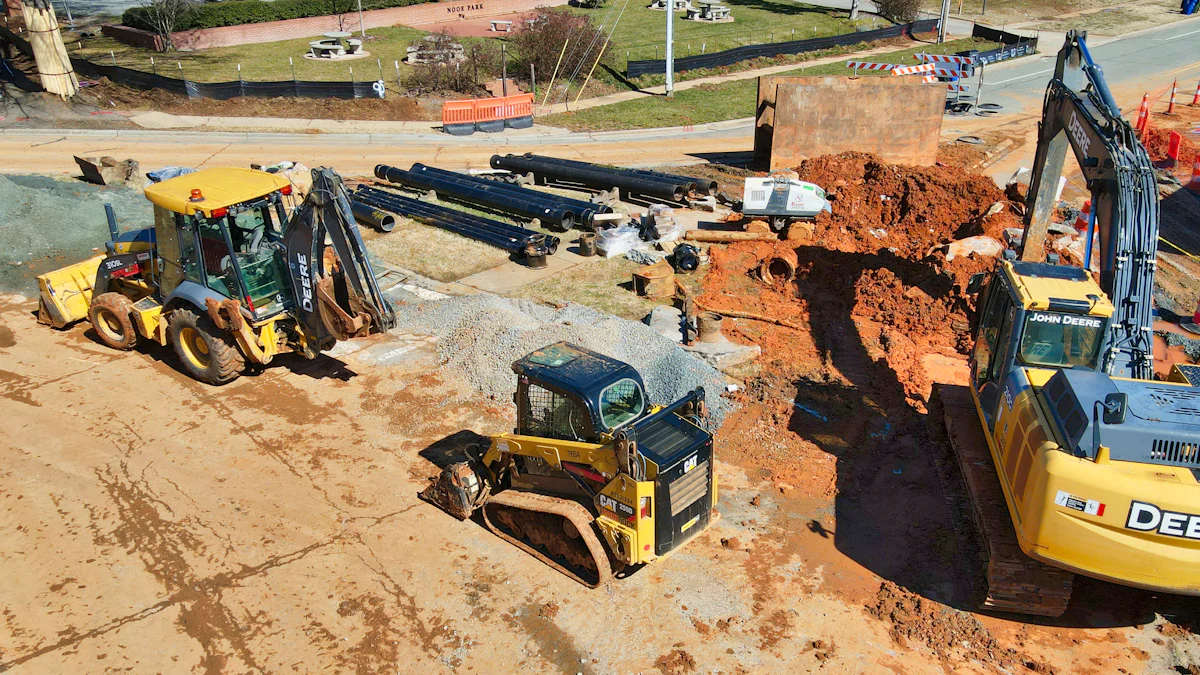
Description and Features
Tiger excavator bucket teeth are designed for maximum penetration and efficiency in tough excavation tasks. Their sharp, pointed shape allows them to break through compacted ground, rocky surfaces, and even frozen soil with ease. These teeth come in two main types: single tiger teeth and twin tiger teeth. Single tiger teeth feature a spike-like design that tapers to a sharp point, making them ideal for precise digging in hard materials. Twin tiger teeth, on the other hand, have a two-pronged structure that doubles their penetration power and provides added stability during operation.
Manufacturers often use durable materials like heat-treated alloy steel to craft these teeth, ensuring they can withstand high-impact forces and abrasive conditions. Some models, such as the 23TFTT and X290TT, are specifically engineered for heavy-duty applications. These teeth are lightweight yet strong, offering excellent performance without overburdening your excavator. Additionally, innovations like self-sharpening designs help maintain their sharpness over time, reducing wear and extending their lifespan.
Applications
Tiger bucket teeth excel in tasks that require precision and power. Their specialized design makes them suitable for:
Trenching: Perfect for creating clean, narrow trenches in compacted or rocky soil.
Digging in hard ground: Effective for breaking through frozen dirt, dense clay, or tightly packed materials.
Rock excavation: Ideal for handling rocky terrains where standard teeth may struggle.
Demolition work: Useful for breaking apart concrete or other hard surfaces during construction projects.
These teeth are particularly valuable in environments where penetration and impact are critical for success.
Advantages and Limitations
Advantages:
Superior penetration: The sharp, pointed design ensures efficient digging in tough materials.
Enhanced productivity: Faster excavation speeds reduce the time spent on each task, improving overall efficiency.
Durability: High-quality materials and self-sharpening features extend the lifespan of the teeth.
Versatility in tough conditions: Suitable for a wide range of challenging applications, from trenching to rock excavation.
Limitations:
Faster wear rate: The sharp edges tend to wear down more quickly than other types of bucket teeth, especially in abrasive environments.
Limited smoothing capability: These teeth may not create smooth surfaces, making them less suitable for tasks requiring a clean finish.
Higher replacement frequency: Due to their faster wear, you may need to replace them more often compared to other designs.
“Tiger bucket teeth are your go-to choice for tough digging and trenching tasks. Their sharpness and precision make them indispensable for breaking through hard, compact materials.”
When choosing tiger excavator bucket teeth, consider the specific demands of your project. These teeth offer unmatched penetration and efficiency, making them a valuable addition to your excavator for challenging excavation jobs.
Flared Excavator Bucket Teeth
Description and Features
Flared excavator bucket teeth are uniquely designed to maximize digging efficiency in softer and loose materials. These teeth feature a wide, flared profile that increases the surface area for scooping and moving materials. This design makes them ideal for applications where precision is less critical, but volume and speed are essential. The broader cutting edge allows for smoother operation, reducing resistance as you work through materials like sand, gravel, or loose soil.
Manufacturers often use durable, wear-resistant materials like heat-treated alloy steel to ensure these teeth can handle demanding conditions. Some models incorporate self-sharpening technology, which helps maintain their cutting edge over time. This feature minimizes downtime and ensures consistent performance. The flared design also reduces stress on the excavator, enhancing the machine’s overall efficiency and lifespan.
Applications
Flared bucket teeth excel in tasks that require high material movement and minimal penetration. Their specialized design makes them suitable for:
Landscaping projects: Ideal for grading, leveling, and clearing loose debris.
Agricultural work: Useful for handling loose soil, compost, or other lightweight materials.
Sand and gravel operations: Perfect for scooping and transporting large volumes of loose aggregates.
Utility work: Effective for backfilling trenches or spreading materials evenly.
These teeth are particularly valuable in environments where speed and volume take precedence over precision.
Advantages and Limitations
Advantages:
Increased efficiency: The wide, flared profile allows you to move more material in less time.
Reduced wear: The design minimizes resistance, which decreases stress on both the teeth and the excavator.
Durability: High-quality materials and self-sharpening features extend the lifespan of the teeth.
Versatility in loose materials: These teeth perform exceptionally well in soft and loose conditions, making them a reliable choice for specific tasks.
Limitations:
Limited penetration: The wide profile is less effective in compacted or rocky soils.
Reduced precision: These teeth may not provide the accuracy needed for detailed excavation work.
Specialized use: Their design makes them less versatile compared to general-purpose teeth.
“Flared bucket teeth are your best option for moving large volumes of loose materials quickly and efficiently. Their unique design ensures smooth operation and reduced wear on your equipment.”
When selecting flared excavator bucket teeth, consider the nature of your project and the materials you’ll encounter. These teeth offer a practical solution for operators focused on speed and efficiency in soft or loose conditions.
Selecting the right excavator bucket teeth is essential for achieving the best results in your projects. Each type of tooth is designed to handle specific tasks, offering unique benefits and limitations. By understanding these characteristics, you can enhance productivity, reduce wear on your equipment, and save costs. Matching the tooth type to your project needs and material conditions ensures optimal performance and longevity. Always evaluate your operating environment and job requirements carefully to make informed decisions that maximize efficiency and extend the life of your machinery.
